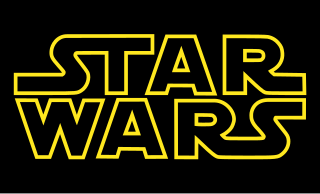 W
WA film series or movie series is a collection of related films in succession that share the same fictional universe, or are marketed as a series.
 W
W893239 or Yakuza-Nijūsan-Ku (ヤクザ23区) is the project name for a collection of short films based on Yakuza and 23 ku in Tokyo, Japan. Each clip is about 5–18 minutes long and is shot by a different director with his own crew from various backgrounds.
 W
WAdams Apples is a Ghanaian film series, starring Yvonne Okoro, Joselyn Dumas, John Dumelo, Naa Ashorkor Mensa-Doku, Anima Misa Amoah, Adjetey Anang, Helene Asante, SoulKnight Jazz, Jasmine Baroudi, Vincent McCauley, Roselyn Ngissah, Fred Kanebi. The series consists of ten drama feature films, known as "chapters", produced by Ken Attoh and directed by Shirley Frimpong-Manso.
 W
WThe Akihabara Trilogy is a series of films set in Akihabara, Tokyo, Japan. The plots of the films revolve around the cosplay and otaku subcultures associated to the location, with themes such as maid cafés and collectible action figures.
 W
WFrom 1973 to 1975, using approximately 500 movie theaters across the US, The American Film Theatre presented two seasons of film adaptations of well-known plays. Each film was shown only four times at each theatre. By design, these were not films of stage productions — they were plays "translated to the film medium, but with complete faithfulness to the original play script." Filmgoers generally subscribed to an entire season of films, as they might if they purchased a season's tickets for a conventional stage theater. About 500,000 subscriptions were sold for the first season of eight plays using direct mail and newspaper advertising. Ely Landau was the producer for the series.
 W
WAngel Guts is a six-film series of pink films produced between 1978 and 1994. The Nikkatsu Corporation was responsible for the production of the majority of the series. In accordance with the "pink film" genre, the prevalent theme in the series is sex, but violence is also featured prominently in the films. Angel Guts is based on the manga series written by Takashi Ishii.
 W
WThe Auton trilogy is a series of direct-to-video spin-off productions based on the long running BBC science fiction series Doctor Who. The three films in the series are Auton (1997), Auton 2: Sentinel and Auton 3. They were produced by the independent BBV company and are sequels to the Third Doctor stories Spearhead from Space and Terror of the Autons. All three films have been reissued on DVD.
 W
WBarbie, a fashion doll manufactured by the American toy company Mattel, Inc., has been a computer animated protagonist starring in direct-to-video animated films. Although Barbie has appeared in miniseries and short films since 1987, the series officially began in 2001 with Barbie in the Nutcracker. It was followed by a total of thirty-five films before it was put on hiatus in 2017. Barbie has appeared as a character in other films, including Mattel's My Scene line as well as the Toy Story film series, but these are not considered part of the franchise. Created by Mattel Creations, the first ten films sold 40 million DVD and VHS units worldwide by 2007, grossing over $700 million in sales. As of 2013, the series has sold over 110 million DVD units worldwide.
 W
WBlondie is an American comic strip created by cartoonist Chic Young. The comic strip is distributed by King Features Syndicate, and has been published in newspapers since September 8, 1930. The success of the strip, which features the eponymous blonde and her sandwich-loving husband, led to the long-running Blondie film series (1938–1950) and the popular Blondie radio program (1939–1950).
 W
WBomba the Jungle Boy is a series of American boys' adventure books produced by the Stratemeyer Syndicate under the pseudonym Roy Rockwood. and published by Cupples and Leon in the first half of the 20th century, in imitation of the successful Tarzan series.
 W
WBoston Blackie is a fictional character created by author Jack Boyle. Blackie, a jewel thief and safecracker in Boyle's stories, became a detective in adaptations for films, radio and television—an "enemy to those who make him an enemy, friend to those who have no friend."
 W
WThe Carmen Miranda Collection is a box set featuring five top movie titles starring Carmen Miranda. It was released by 20th Century Fox Home Entertainment on June 17, 2008.
 W
WThe cartoon character, Casper the Friendly Ghost who appears in numerous cartoon shorts as well as Harvey Comics publication, has appeared in five films since his inception, most of which were either released in television or straight-to-video while only one was released theatrically. Many for the most part are unrelated to each other. Like in the comics and animated shorts, the films feature Casper, a ghost of a deceased child, who refused to frighten others and would like nothing more than to be friendly around the world; however, due to the nature of what he appears to be, it would often get him shunned and petrified by whoever he encounters, but along the way, he would find and befriend a certain someone he could identify himself with, and would often help that someone in need.
 W
WCharlie Chan is a fictional Honolulu police detective created by author Earl Derr Biggers for a series of mystery novels. Biggers loosely based Chan on Hawaiian detective Chang Apana. The benevolent and heroic Chan was conceived as an alternative to Yellow Peril stereotypes and villains like Fu Manchu. Many stories feature Chan traveling the world beyond Hawaii as he investigates mysteries and solves crimes.
 W
WThe Cremaster Cycle is a series of five feature-length films, together with related sculptures, photographs, drawings, and artist's books, created by American visual artist and filmmaker Matthew Barney.
 W
WThe Dexter Riley film series consists of American Science fiction-comedy films, centered around a college student named Dexter Riley, portrayed by Kurt Russell. The films, produced by The Walt Disney Company, taking place at the fictional Medfield College follow the science class lead by Professor Quigley, and their experiments, projects, and adventures. The college, under the direction of Dean Eugene Higgs becomes involved in the nefarious plans of billionaire-turned-criminal, A.J. Arno.
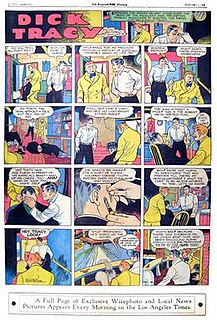 W
WDick Tracy is an American comic strip featuring Dick Tracy, a tough and intelligent police detective created by Chester Gould. It made its debut on Sunday, October 4, 1931 in the Detroit Mirror, and it was distributed by the Chicago Tribune New York News Syndicate. Gould wrote and drew the strip until 1977, and various artists and writers have continued it. Dick Tracy has also been the hero in a number of films, including Dick Tracy in which Warren Beatty played the lead in 1990. Tom De Haven praised Gould's Dick Tracy as an "outrageously funny American Gothic", while Brian Walker described it as a "ghoulishly entertaining creation" which had "gripping stories filled with violence and pathos".
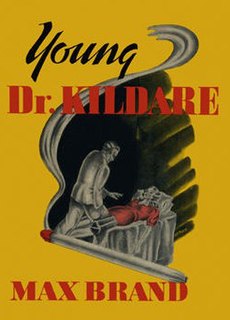 W
WDr. James Kildare is a fictional American medical doctor, originally created in the 1930s by the author Frederick Schiller Faust under the pen name Max Brand. Shortly after the character's first appearance in a magazine story, Paramount Pictures used the story and character as the basis for the 1937 film Internes Can't Take Money, starring Joel McCrea as Jimmie Kildare. Metro-Goldwyn-Mayer (MGM) subsequently acquired the rights and featured Kildare as the primary character in a series of American theatrical films in the late 1930s and early 1940s. Several of these films were co-written by Faust, who also continued to write magazine stories and novels about the character until the early 1940s. Kildare was portrayed by Lew Ayres in nine MGM films.(Ayres was drafted in 1942 and served as a non-combatant medic until 1946.) Later films set in the same hospital featured Dr. Gillespie. Ayres returned to voice the Kildare character in an early 1950s radio series. The 1961-1966 Dr. Kildare television series made a star of Richard Chamberlain and gave birth to a comic book and comic strip based on the show. A short-lived reboot of the TV series, Young Doctor Kildare, debuted in 1972 and ran for 24 episodes.
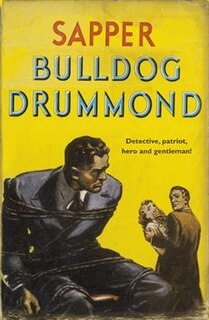 W
WHugh "Bulldog" Drummond is a fictional character, created by H. C. McNeile and published under his pen name "Sapper". Following McNeile's death in 1937, the novels were continued by Gerard Fairlie. Drummond is a First World War veteran who, fed up with his sedate lifestyle, advertises looking for excitement, and becomes a gentleman adventurer. The character has appeared in novels, short stories, on the stage, in films, on radio and television, and in graphic novels.
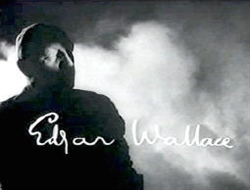 W
WThe Edgar Wallace Mysteries was a British second-feature film series, produced at Merton Park Studios for Anglo-Amalgamated. There were 47 films in the series, completed between 1960 and 1965. The series was screened as The Edgar Wallace Mystery Theatre on television in the United States.
 W
WThe fictional superhero team Fantastic Four featured in Marvel Comics publication has appeared in four live-action films since its inception. The plots deal with four main characters, known formally as Reed Richards, Susan Storm, Ben Grimm and Johnny Storm, and how they adapt to the superpowers they attain.
 W
WThe Hangover is a series of three American comedy films created by Jon Lucas and Scott Moore, and directed by Todd Phillips. All three films follow the misadventures of a quartet of friends who go on their road trip to attend a bachelor party. While all of the films finds three of the four men on a mission to find their missing friend, the first two films focus on the events following a night of debauchery before a party in Las Vegas and Bangkok; whereas the third and final film involves a road trip and a kidnapping in lieu of a bachelor party.
 W
WHerbie, also known as The Love Bug, is a media franchise consisting of American race car-sport family-comedies, including five theatrical feature films, one television film, a television series, and other multimedia releases. The overall story centers around the titular character, an sentient anthropomorphic 1963 Volkswagen Beetle with a mind of its own and is capable of driving himself. The vehicle is often times a legitimate contender, though the underdog contestant in competitive races, but to a greater degree assists his human owners in bettering their lives.
 W
WHot Wheels: AcceleRacers is a 2005 computer-animated series of four films produced by Canadian company Mainframe Entertainment, which also produced the television series ReBoot. Available on DVD and VHS, it has also been shown on Cartoon Network.
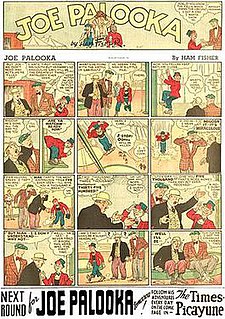 W
WJoe Palooka is an American comic strip about a heavyweight boxing champion, created by cartoonist Ham Fisher. The strip debuted on April 19, 1930 and was carried at its peak by 900 newspapers. It was cancelled in 1984.
 W
WThe K-9 film series, consists of Buddy cop family-comedy films including one theatrical film, one made-for-television film, and two straight-to-home video films. The general plot centers around a hard-boiled police detective and the German Shepherd police dogs they have as their respective partner and the cases they work together to solve; with the spin-off TV movie, which was initially developed as a pilot episode for a television series before it was passed on, revolves around a police detective who is teamed up with a mechanically enhanced German Shepperd to solve a criminal investigation.
 W
WThe Keystone Cops are fictional, humorously incompetent policemen featured in silent film slapstick comedies produced by Mack Sennett for his Keystone Film Company between 1912 and 1917.
 W
WThe Kingdom of Solomon is an Iranian religious/historical film series produced by Mojtaba Faravardeh and directed by Shahriar Bahrani who has made Saint Mary before. The Kingdom of Solomon was going to be released internationally in November 2010 after its screening in Iran, but due to some technicalities its global release has been delayed. The film tells the life story of Prophet Solomon, the King of Israelites. It is mostly based on the Islamic accounts of Solomon's prophetic life extracted from the Qur'an but it also draws upon parallels found in some Jewish texts.
 W
WThe Koker trilogy is a series of three films directed by acclaimed Iranian film-maker Abbas Kiarostami: Where Is the Friend's Home? (1987), Life, and Nothing More... and Through the Olive Trees (1994). The designation was made by film theorists and critics, rather than by Kiarostami himself, who resists the designation and notes that the films are connected only by the accident of place. He has suggested that it might be more appropriate to consider the latter two titles plus Taste of Cherry (1997) as a trilogy, since these are connected by the theme of life's preciousness.
 W
WThe Liken Series is a continuing musical based on events in the Old Testament and New Testament of the Holy Bible, as well as stories from the Book of Mormon. The series is popular among many LDS/Mormon families. They have a Bible Site, a Scriptures site, a Studio Site, and a Beta TV Site where you can watch select movies and clips. It remains unannounced as to whether they might create musicals based on stories in the Doctrine and Covenants or Pearl of Great Price.
 W
WLucky Stars (or Five Lucky Stars; was a Hong Kong action comedy film series in the 1980s and 1990s, blending Chinese martial arts with bawdy comedy. The films featured an ensemble cast, with many of the actors appearing in successive films.
 W
WLum and Abner was an American network radio comedy program created by Chester Lauck and Norris Goff that was aired from 1931 to 1954. Modeled on life in the small town of Waters, Arkansas, near where Lauck and Goff grew up, the show proved immensely popular. In 1936, Waters changed its name to Pine Ridge after the show's fictional town.
 W
WMaisie Ravier is a fictional character, the leading character of ten films (1939–1947) and the radio show The Adventures of Maisie. She was played by actress Ann Sothern (1909–2001). Eight of the ten Maisie films were written by Mary C. McCall Jr.
 W
WNight of the Day of the Dawn of the Son of the Bride of the Return of the Revenge of the Terror of the Attack of the Evil, Mutant, Alien, Flesh Eating, Hellbound, Zombified Living Dead is a series of parody films written by James Riffel as spoofs adding his own scripts on already known films and television footage after deleting the original scripts from the films.
 W
WThe Nutty Professor franchise consists of American science fiction-slapstick comedies, including three theatrical films, one straight-to-home video release, a musical stage play, and a theatrical reboot in development. Based on an original story by Jerry Lewis, inspired loosely by Strange Case of Dr. Jekyll and Mr. Hyde (1886) by Robert Louis Stevenson, the series comedically includes the basic concepts of psyche including id versus ego. The plot of each installment centers around scientists with genius-level intellect, yet awkward and nerdy social skills. Upon meeting beautiful women, the respective professors develop potions that transforms them into a sophisticated, confident, popular, and attractive alternate personality; albeit villainous personas by nature. In parodying Dr. Jekyll and Mr. Hyde, the series as a whole explores the importance of self worth.
 W
WOtoko wa Tsurai yo is a Japanese film series starring Kiyoshi Atsumi as Tora-san (寅さん), a kind-hearted vagabond who is always unlucky in love. The series itself is often referred to as "Tora-san" by its fans. Spanning 48 installments released between 1969 and 1995, all of the Otoko wa tsurai yo films except episodes 3 and 4 were directed by Yōji Yamada, who also wrote all the screenplays.
 W
WParadise is the collective name of three films directed by Ulrich Seidl: Paradise: Love (2012), Paradise: Faith (2012) and Paradise: Hope (2013). They focus on three women from one family; one of them travels to Kenya as a sex tourist, one has to spend time at a weight loss camp, and one tries to propagate Catholicism. The project is an Austrian majority production with co-producers in Germany and France. It was conceived as one feature film, but after a long gestation became three entries forming a trilogy. The first installment, Paradise: Love, competed for the Palme d'Or at the 2012 Cannes Film Festival. Seidl originally planned to premiere all three films at the same event, but after the Cannes selection decided to roll out parts two and three, Paradise: Faith and Paradise: Hope, at other major film festivals. The individual films are named after the three theological virtues, and focus on how the protagonists conceive their view of paradise.
 W
WThe Pink Panther is a British-American media franchise primarily focusing on a series of comedy-mystery films featuring an inept French police detective, Inspector Jacques Clouseau. The franchise began with the release of the classic Pink Panther film in 1963. The role of Clouseau was originated by, and is most closely associated with, Peter Sellers. Most of the films were written and directed by Blake Edwards, with theme music composed by Henry Mancini. Elements and characters inspired by the films were adapted into other media, including books, comic books and animated series.
 W
WThe Robert Langdon films are a series of American action-adventure mystery-thriller films directed by Ron Howard. The films, based on the novel series written by Dan Brown, center around the fictional character of Robert Langdon. Though based on the book series, the films have a different chronological order, consisting of: The Da Vinci Code (2006), Angels & Demons (2009) and Inferno (2016). Despite negative critical reception, the film series as a whole has grossed almost $1.5 billion worldwide.
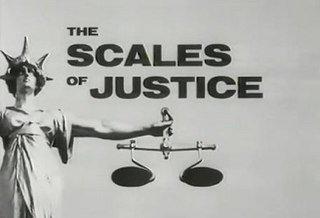 W
WThe Scales of Justice was a series of thirteen British cinema featurettes produced between 1962 and 1967 for Anglo-Amalgamated at Merton Park Studios in London. The first nine episodes were made in black and white, the last four in colour. The final episode, Payment in Kind, was Merton Park's last production.
 W
WRefinery29 (R29) is an American multinational digital media and entertainment website focused on young women. It is owned by Vice Media.
 W
WShehrnaz is a Pakistani television drama serial, aired on Urdu 1 from 12 November 2016 to 22 March 2017. It starred Ayeza Khan, Alyy Khan, Imran Ashraf and Farhan Ahmed Malhi. It is produced by Ayeza Khan's husband Danish Taimoor. It's makeup and stylish is done by Qurat-ul-Ain (Aini) and styled by Anila Murtaza. Amina Yasmeen and Sana Abbas are wardrobes of Ayeza while Maaz jee is the wardrobe of Alyy.
 W
WShinobi no Mono (忍びの者) is a series of jidaigeki novels written by Tomoyoshi Murayama originally serialized in the Sunday edition of the newspaper Akahata from November 1960 to May 1962. Shinobi no mono is the long form of the phrase meaning ninja, see the Ninja article for details.
 W
WThe Sons of Hercules was a syndicated Embassy Pictures television show that aired in the United States of America in the 1960s. The series repackaged 13 Italian sword-and-sandal films by giving them a standardized theme song for the opening and closing titles, as well as a standard introductory narration attempting to relate the lead character in each film to the Greek demigod Hercules. These films however were not all originally made as "Hercules" films in Italy. Although two of them did originally feature Hercules, four of the films were originally Maciste movies in Italy, and the others were just isolated gladiator or mythological hero movies not released theatrically in the US.
 W
WSpooney Melodies was a series of live action musical shorts produced Warner Bros. aimed to showcase popular tunes of the day. Only the first entry in the series bore the title "Spooney Melodies." Subsequent releases, of which there were four, bore the series title "Song'nata."
 W
WSweedie is a fictional character portrayed by actor Wallace Beery in drag, in a series of comedy films from 1914–1916. The series is notable as the means by which Beery, a particularly masculine actor, first made his name in the film industry.
 W
WThe fictional comic book team known as the Teenage Mutant Ninja Turtles created by Kevin Eastman and Peter Laird have appeared in six feature-length films since their debut. The first film, titled Teenage Mutant Ninja Turtles, was released in 1990 at the height of the franchise's popularity and was a commercial success. The success of the film garnered two direct sequels, Teenage Mutant Ninja Turtles II: The Secret of the Ooze in 1991 and Teenage Mutant Ninja Turtles III in 1993. A computer-generated imagery (CGI) film titled TMNT was released in 2007 and built on the success of the 2003–2009 TV series. A fifth film by Paramount Pictures and Nickelodeon Movies was released on August 8, 2014, and served as a reboot to the original live-action films. A sequel, Teenage Mutant Ninja Turtles: Out of the Shadows, was released on June 3, 2016. The six films have grossed $1.2 billion worldwide. A seventh film, which will be a CGI reboot, is in development.
 W
WThe Three Colours trilogy is the collective title of three films directed by Krzysztof Kieślowski: Three Colours: Blue (1993), Three Colours: White (1994), and Three Colours: Red (1994). The trilogy was a co-production between France, Poland and Switzerland, and is in the French language, with the exception of White in Polish and French. All three films were co-written by Kieślowski and Krzysztof Piesiewicz, produced by Marin Karmitz and composed by Zbigniew Preisner.
 W
WThis is a complete list of short subjects and feature films that featured The Three Stooges released between 1930 and 1970.Moe Howard, Larry Fine and Shemp Howard appeared in a single feature film with Ted Healy released by Fox Film Corporation entitled Soup to Nuts (1930). Shemp departed the act in 1932 to pursue a solo career and was replaced by his younger brother Curly Howard. This incarnation of the team appeared in several shorts and feature films with Healy at Metro-Goldwyn-Mayer in 1933 and 1934. Moe and Shemp appeared without Larry or Healy in a 1929 Fox Movietone Newsreel. Moe appeared without Larry, Curly, or Healy in the 1933 MGM PSA Give a Man a Job. Moe and Curly appeared without Healy or Larry in the MGM feature film Broadway to Hollywood (1933). Shemp appeared without the Stooges in the 1934 Vitaphone short Smoked Hams with Lionel Stander and Daphne Pollard. Moe and Curly appeared without Healy or Larry in the MGM short subject Jail Birds of Paradise (1934). Curly appeared in the MGM short subject Roast Beef and Movies (1934) without Healy, Moe, or Larry. Larry and Healy appeared without Moe or Curly in the MGM feature Stage Mother (1933). Curly and Healy appeared without Moe or Larry in the MGM feature Operator 13 (1934).
 W
WThe Twilight Saga is a series of five vampire-themed romance fantasy films from Summit Entertainment based on the four novels published by author Stephenie Meyer. The films star Kristen Stewart, Robert Pattinson, and Taylor Lautner. The series has grossed over $3.3 billion worldwide. The first installment, Twilight, was released on November 21, 2008. The second installment, New Moon, followed on November 20, 2009, breaking box office records as the biggest midnight screening and opening day in history, grossing an estimated $72.7 million. The third installment, Eclipse, was released on June 30, 2010, and was the first of the series to be released in IMAX.
 W
WWelcome to the Blumhouse is a film series consisting of theme-related anthological thriller-horror stories, developed and produced by Blumhouse Productions for Prime Video as Amazon Prime Originals. Announced as an ongoing collaboration between the companies, the films include "distinctive vision[s] and unique perspective[s] on common themes". The first four centered around "family and love as redemptive or destructive forces", while the next four releases will center around "institutional horrors and personal phobias."
 W
WWhy We Fight is a series of seven documentary films produced by the US Department of War from 1942 to 1945, during World War II. The films were originally written for American soldiers to help them understand why the United States was involved in the war, but US President Franklin Roosevelt ordered it to be distributed also for public viewing.
 W
WThe Wonderful World of Puss 'n Boots is a 1969 Japanese cel-animated action-comedy musical film produced by Tōei Animation and the second film to be directed by Kimio Yabuki. The screenplay and lyrics, written by Hisashi Inōe and Morihisa Yamamoto, is based on the European literary fairy tale of the same name by Charles Perrault, expanded with elements of Alexandre Dumas-esque swashbuckling adventure and funny animal slapstick, with many other anthropomorphic animals in addition to the title character. The Tōei version of the character himself is named Pero, after Perrault. It is the 15th film that Tōei Dōga produced.